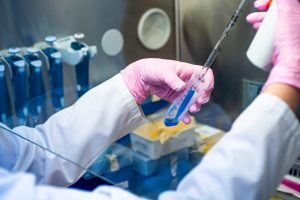22 Dec Why Choose Regenerative Medicine at a Stem Cell Clinic
Regenerative medicine is a highly promising new form of medicine that is helping people improve conditions that are typically difficult to treat with standard medical procedures. This article explores the basics of regenerative medicine so you can decide for yourself if it’s something you would consider.
What Is Regenerative Medicine?
The basic premise of regenerative medicine is encouraging the body to engage in its own healing, repair, and regeneration processes. In doing this, regenerative medicine helps the body manage a number of different conditions. Regenerative medicine helps to restore function and health to tissues, organs, and bones damaged by injury or aging.
Types of Regenerative Medicine
Stem Cell Therapy
The most well-understood aspect of regenerative medicine involves the use of stem cell therapy.
Stem cells are a form of ‘basic’ cell which can adopt a number of different roles depending on where they are in the body. When stem cells are injected into an injury site, they begin to take on the role of other cells in the area.
This allows these stem cells to repair damage and replace dysfunctional cells. Over time this can help to restore function to these damaged areas.

Tissue & Organ Generation
Tissue engineering involves a strategy that encourages the body to generate new tissues. This is often done by implanting scaffolds into the body. The scaffold is designed in the same geometric shape as the necessary tissue. Cells are attracted to this scaffold and will begin to develop a new tissue in the same shape.
More complex and costly forms of regenerative medicine may involve the growth of tissues and organs in laboratory settings. These healthy and functional organs can be used to replace damaged or failing organs in patients with health conditions.
One of the benefits of this form of therapy comes into play when a patient’s own cells are used to generate these organs. This helps to minimize the chances of the organs or tissues being rejected, and may also reduce the need to use immunosuppressant drugs.
Medical Devices / Artificial Organs
If you are thinking of medical devices and artificial organs versus stem cell therapy, the stem cell clinic Beverly Hills may be able to provide more information about this matter. These are alternatives to traditional organ replacement which help to mitigate the chance of organ rejection and the need for immunosuppressants.
One such example is circulatory support devices which can help to prevent the need for heart transplants. These have been used for long-term circulatory support in a number of patients with positive success.
Regenerative medicine is a very promising branch of medicine that helps to facilitate healing within the body of a patient. Various therapies are employed in this field including stem cell therapy, tissue generation, and the use of medical devices.
If you think that regenerative medicine could be helpful for you then you should consider getting in touch with a stem cell clinic Beverly Hills. They can provide you with further information on stem cell therapy.


No Comments